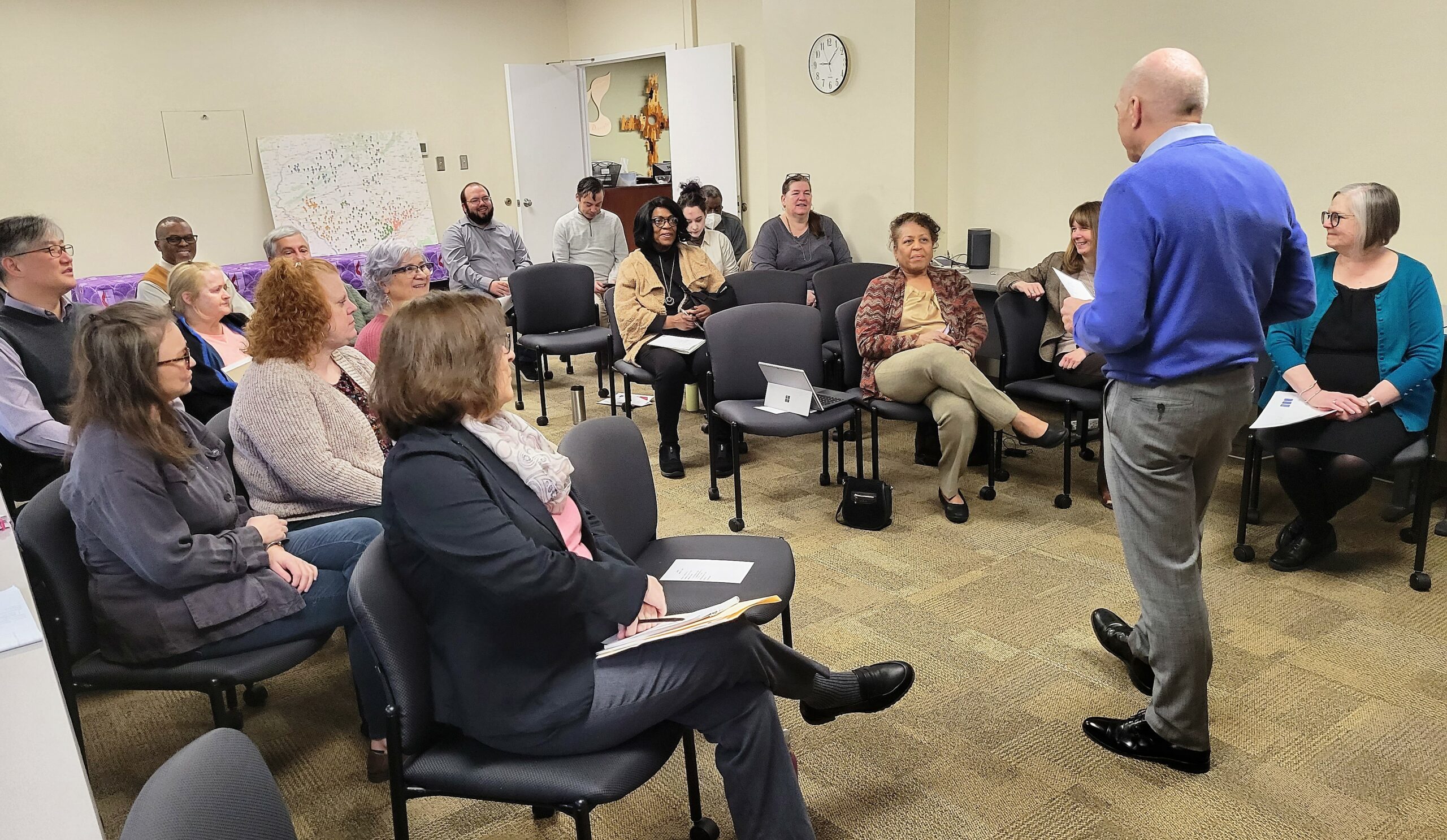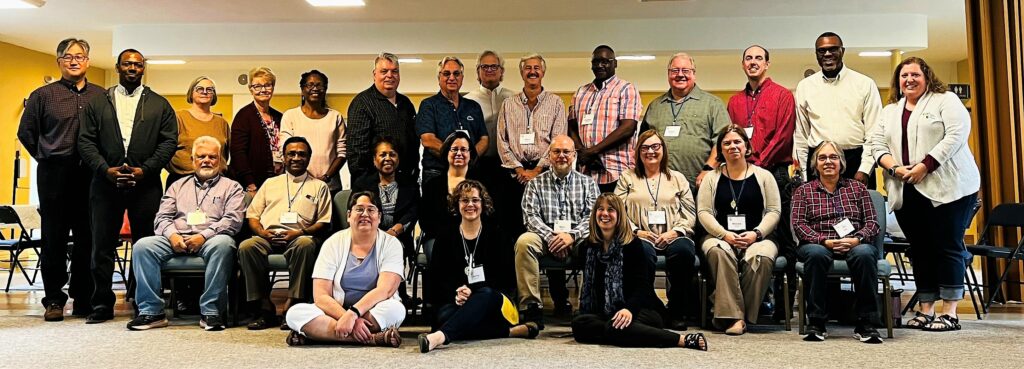 Bishop John Schol discusses the Eastern PA and Greater New Jersey conferences' new affiliation to EPA staff in January 2023. John Coleman photo
Bishop John Schol discusses the Eastern PA and Greater New Jersey conferences' new affiliation to EPA staff in January 2023. John Coleman photo
The Eastern PA Annual Conference in May will consider resolutions that point the way to a future of Possibility, the apt theme for its 2023 session. Members will consider a major, new Strategic Direction for EPA’s operations and ministries, proposed by the Cabinet and the Connectional Table.
Preparatory steps in that new direction are already being taken through EPA’s affiliation with the Greater New Jersey Conference in some programs, staffing and administrative areas.
One ambitious main goal is to increase the percentage of vital congregations in EPA from 25% to 35%, by helping churches focus on five markers of vitality: worship, small groups, mission, stewardship and making new disciples. That goal requires cultivating passionate disciples, vital congregations and transformational leaders.
The resolution reports progress in some of these markers and among other specific priorities, like “ending the sin of racism and responding to mission opportunities. That progress includes increases in:
- Church members’ participation in small groups and hands-on mission;
- Percentages of people of color (racial-ethnic) attending churches;
- Conference board and agency chairpersons who are people of color;
- Cross-racial/cross-cultural pastoral appointments;
- Facilitators trained to work with leaders on cross-racial/cross-cultural ministry through the Journey of Hope (formerly EPA’s Path Toward Wholeness)
- Hurricane Ida-damaged homes renovated and rebuilt by Project Restoration; and
- Participants attending EPA’s four camp & retreat centers.

them to help pastors lead Pathways congregations into greater health and vitality.
Additional Strategic Direction objectives—each with quantitative measures—call for the conference to:
- Create a culture of call to pastoral ministry, leading to more clergy for appointments.
- Grow participation in a new curriculum of EPA&GNJ Leadership Academy courses.
- Train facilitators to help congregations end the sin of racism.
- Equip leaders to engage their congregations in interpersonal community outreach.
- Equip leaders to lead their congregations to financial health by fostering generosity and sustainability in managing church resources.
- Develop more, diverse young leaders through camping, retreats, IGNITE youth conferences and leadership training experiences.
- Use EPA’s new regional structure to help superintending teams support clergy and congregational leaders in pursuing congregational health, vitality and achievement of goals.
Conference to vote on leadership, other ministry matters
Just as the conference endeavors to recruit, create and equip more leaders for congregations, EPA’s Committee on Leadership wants to recruit more elected leaders conferencewide for administrative and program committees and councils. The Committee on Leadership will nominate to the conference a full roster of administrative and Connectional Ministries committees and chairpersons for the coming year.
Members will also vote on Equitable Compensation levels for pastors, eight Advance Special projects recommended for local church support, and updates to the Clergy Retirement Security Program and the Rental/Housing Allowance for Retired or Disabled Clergy. New Safe Sanctuaries policies will be presented to further ensure the safety of children, youth and now vulnerable adults in church facilities and activities.
Meanwhile, the conference will bid farewell to congregations that have played a significant role in its overall mission and ministry. Members will approve the closure of five churches: Pomeroy UMC; Evangelical UMC Pottsville; Frankford Memorial UMC Philadelphia; Green Hill UMC Conestoga; and St. James UMC Philadelphia.
They also are expected to approve the requests of five churches to disaffiliate from the denomination. Those churches have undergone the required discernment and voting process and accepted the terms and conditions set by the Conference Trustees. They are:
- Iglesia Metodista Unida Nuevo Nacimiento (New Birth UMC), in Lebanon;
- Limeville UMC, in Gap;
- New Hanover UMC, in Gilbertsville;
- Wind Gap UMC; and
- Davis Chapel UMC, in Zion Grove
The conference’s Council on Finance & Administration also proposes plans for properly allocating the various funds received from departing churches as part of their disaffiliation agreements.
More resolutions presented
A resolution by three conference members requests a revision to the process and terms for congregations that still want to disaffiliate. The Rev. Joan Trout and lay members Doug O’Connell and Jeffery Pijanowski are asking EPA’s Board of Trustees to consider revising current standards and conditions for disaffiliation under Par. 2553. The deadline to declare an intent to disaffiliate passed September 30, 2022. But they are asking for an extension to July 31, 2023, and that “no additional trainings, information sessions, or conference guided church discussions shall be required for local churches seeking to disaffiliate.”
The three members request a call for a Special Session of the Annual Conference to vote on new pending requests for disaffiliation in November before the denomination’s mandated December 31 disaffiliation deadline. Because the conference cannot compel the Trustees to make any changes in the process or timeline, the resolution is considered “aspirational.”
In other resolutions the Rev. Roger Thomas of EPA’s Fight for Floyd and Beyond Policy Committee submitted one relating to “Jury Justice.” It asks the conference to support the Juror Compensation Bill in the Pennsylvania state legislature, advocating for an increase in the daily pay for jurors—now only $9/hour—to match the state’s new minimum wage of $17/hour.
Thomas and the Fight for Floyd and Beyond Committee, a racial justice education and advocacy initiative formed after George Floyd’s 2020 murder by Minneapolis police, also propose that the conference call for a legislative study and improvements in Pennsylvania’s Human Trafficking Act.
Another resolution, presented by the Rev. Robin Hynicka on behalf of Arch Street UMC Philadelphia, asks the conference to support proposals for the creation of Regional Conferences in the U.S., Africa, Europe the Philippines, by the delayed General Conference when it gathers in 2024 in Charlotte, NC.
The resolution supports the Christmas Covenant, devised by UMC Central Conference leaders, in addition to a similar regionalization vision proposed by the UMC’s Connectional Table. Their common goal is to foster bring equity to the denomination’s global legislative assembly, which has always been dominated by the U.S. church’s affairs and influence.
